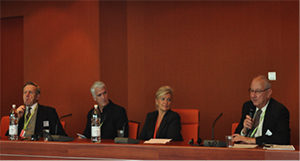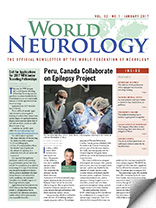By Peter Spencer and Jacques Reis

Speaking at the welcome at the Council of Europe were (from left) Professor Christman of the Faculty of Medecine, Professor de Seze of the Department of Neurology, Dr. Mengus of the COE and Professor Sandner of the University of Strasbourg.
Air pollution is an increasing concern for humanity. The subject urgently needs more attention from medical scientists and society alike. It has long been recognized as a major health threat with multiple impacts, increasing mortality, and morbidity. Pulmonary and cardiovascular diseases are well known outcomes. Brain impacts are an emergent challenge, as are related epigenetic changes and developmental issues.
For the first time, a conference tackled these issues in an inter-professional and translational approach. Basic researchers, epidemiologists, public health specialists, and neurologists assessed current knowledge and identified key gaps that mandate further research.
The conference, which took place in a pleasant Christmas atmosphere in Strasbourg, Germany, was organized by the Club de Neurologie de l’Environnement, NEUREX, and the Environmental Neurology Applied Research Group of the World Federation of Neurology
While compelling data are lacking, there is growing concern that continuous exposure to heavily polluted air might perturb brain development, increase the risk of ischemic stroke in adults, and even contribute to the development of neuro-degenerative and behavioral disorders.
The historical correlation between childhood exposure to lead from gasoline, population IQ attainment, and violent behavior during adulthood, coupled with experimental evidence of persistent epigenetic changes in the brains of lead-exposed primates, serves as an early warning of the dire potential effects of neuropollution.
That fine particles suspended in breathable air enter the brain is certain, whether directly via the sensory innervation of the olfactory epithelium or through pulmonary transfer to the circulation, the lymphatic system or other peripheral route. How the brain responds to neuropollution is the subject of debate. Is the particulate garbage removed without incident by normal physiological processes? Does its presence trigger a neuroinflammatory response? Is this a short-term event or can this lead to temporary or persistent brain cell dysfunction and damage? Can this initiate or exacerbate a neurodegenerative process related to amyotrophic lateral sclerosis, Parkinson’s disease or Alzheimer’s disease?
Given the extraordinary levels of ambient air pollution in many population centers around the globe, the ever-increasing trend of human urbanization, the rapid projected growth of some of the most populous cities in Africa and Asia, and the growing evidence for adverse health consequences of neuropollution, the Strasbourg conferees urged immediate action to curb air pollution and greater investment in research to establish the health effects and their underlying mechanisms.
The organizers thank La Région Grand Est, the Council of Europe, and the municipality of Oberhausbergen for their kind support.
Peter Spencer, PhD, FANA, FRC, is a professor of neurology at the School of Medicine and senior scientist at the Oregon Institute of Occupational Health Sciences, both at the Oregon Health & Science University, Portland. Jacques Reis, MD, is with University Hospitals, Strasbourg, France, and is chair of the WFN Environmental Neurology Research Group.


